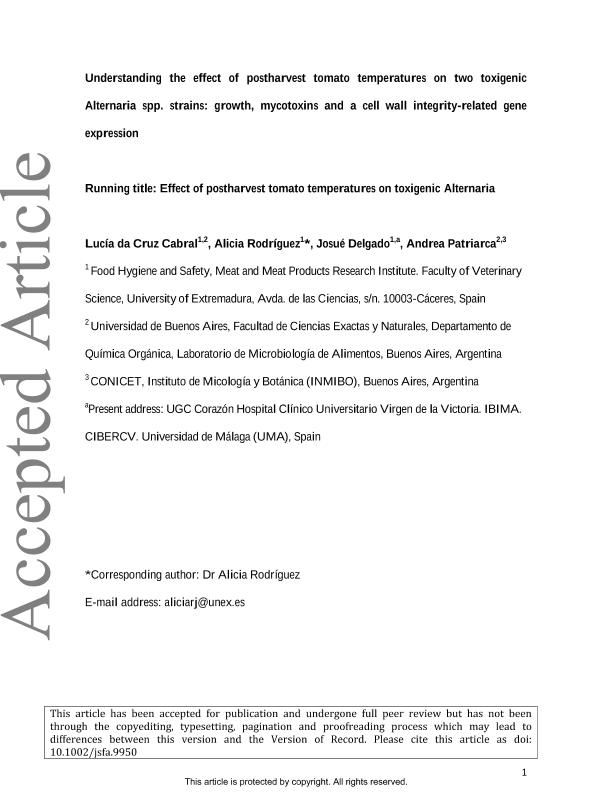Mostrar el registro sencillo del ítem
dc.contributor.author
Da Cruz Cabral, Lucía Mariana

dc.contributor.author
Rodríguez, Alicia
dc.contributor.author
Delgado, Josué

dc.contributor.author
Patriarca, Andrea Rosana

dc.date.available
2022-02-03T14:37:27Z
dc.date.issued
2019-12
dc.identifier.citation
Da Cruz Cabral, Lucía Mariana; Rodríguez, Alicia; Delgado, Josué; Patriarca, Andrea Rosana; Understanding the effect of postharvest tomato temperatures on two toxigenic Alternaria spp. strains: growth, mycotoxins and cell-wall integrity-related gene expression; John Wiley & Sons Ltd; Journal of the Science of Food and Agriculture; 99; 15; 12-2019; 6689-6695
dc.identifier.issn
0022-5142
dc.identifier.uri
http://hdl.handle.net/11336/151256
dc.description.abstract
BackgroundTomato fruits are susceptible to Alternaria spp. spoilage. A correct postharvest management is necessary to prevent mould growth and mycotoxin accumulation, being the temperature one of the main factors. The effect of different postharvest temperatures (5, 12, 25 and 35 °C) on growth, mycotoxin production and a stress-related gene expression by two Alternaria spp. was assessed. ResultsGrowth rates decreased rapidly when temperature was higher than the optimum (25 °C), while a gradual reduction was detected at lower temperatures. Tenuazonic acid (TeA) was strongly synthesised at all temperatures evaluated, with a maximum between 12 and 25 °C. Alternariol monomethyl ether (AME) was produced only at the two lowest temperatures; with a peak at 12 °C. Regarding the expression of the stress-related RHO1 gene, during active fungal growth both Alternaria spp. showed more copies of the gene as temperature increased. At the stationary phase, the RHO1 gene expression was significantly higher at 12 °C, coinciding with AME highest accumulation. ConclusionChanges on temperatures related to different postharvest stages of tomato fruits markedly affect toxigenic Alternaria spp. The highest levels of both mycotoxins were recorded at 12 °C, a common storage temperature for tomato fruit. Additionally, an association between alternariols biosynthesis and the cell wall integrity pathway was noticed in relation to temperature, suggesting that temperature may act as stressor stimulating the RHO1 gene expression, which in turn triggers this mycotoxin synthesis. These results will be useful in developing new strategies to efficiently control Alternaria spoilage in tomato fruit and by-products.
dc.format
application/pdf
dc.language.iso
eng
dc.publisher
John Wiley & Sons Ltd

dc.rights
info:eu-repo/semantics/openAccess
dc.rights.uri
https://creativecommons.org/licenses/by-nc-sa/2.5/ar/
dc.subject
ALTERNARIA
dc.subject
ALTERNARIOL MONOMETHYL ETHER
dc.subject
FOOD SAFETY
dc.subject
TENUAZONIC ACID
dc.subject
TOMATO FRUIT
dc.subject.classification
Otras Ciencias Naturales y Exactas

dc.subject.classification
Otras Ciencias Naturales y Exactas

dc.subject.classification
CIENCIAS NATURALES Y EXACTAS

dc.title
Understanding the effect of postharvest tomato temperatures on two toxigenic Alternaria spp. strains: growth, mycotoxins and cell-wall integrity-related gene expression
dc.type
info:eu-repo/semantics/article
dc.type
info:ar-repo/semantics/artículo
dc.type
info:eu-repo/semantics/publishedVersion
dc.date.updated
2020-11-20T14:48:57Z
dc.journal.volume
99
dc.journal.number
15
dc.journal.pagination
6689-6695
dc.journal.pais
Reino Unido

dc.journal.ciudad
Londres
dc.description.fil
Fil: Da Cruz Cabral, Lucía Mariana. Universidad de Buenos Aires. Facultad de Ciencias Exactas y Naturales. Departamento de Química Orgánica; Argentina. Universidad de Extremadura; España
dc.description.fil
Fil: Rodríguez, Alicia. Universidad de Extremadura; España
dc.description.fil
Fil: Delgado, Josué. Universidad de Extremadura; España
dc.description.fil
Fil: Patriarca, Andrea Rosana. Universidad de Buenos Aires. Facultad de Ciencias Exactas y Naturales. Departamento de Química Orgánica; Argentina. Consejo Nacional de Investigaciones Científicas y Técnicas. Oficina de Coordinación Administrativa Ciudad Universitaria. Instituto de Micología y Botánica. Universidad de Buenos Aires. Facultad de Ciencias Exactas y Naturales. Instituto de Micología y Botánica; Argentina
dc.journal.title
Journal of the Science of Food and Agriculture

dc.relation.alternativeid
info:eu-repo/semantics/altIdentifier/url/https://onlinelibrary.wiley.com/doi/abs/10.1002/jsfa.9950
dc.relation.alternativeid
info:eu-repo/semantics/altIdentifier/doi/http://dx.doi.org/10.1002/jsfa.9950
Archivos asociados
